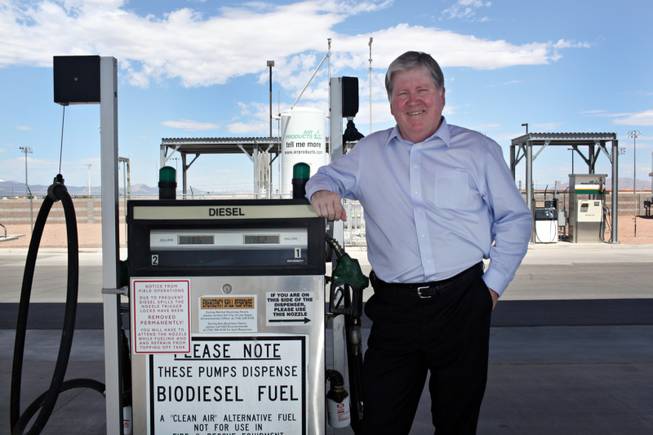
As fleet and transportation services manager for Las Vegas, Dan Hyde has been largely responsible for implementing an alternative fuel policy for the city’s fleet of cars, trucks and street sweepers. “The city is the perfect venue for cutting-edge technology like these hybrids,” he said, “because we can put the vehicles through a mix of uses.”
Wednesday, Aug. 12, 2009 | 2 a.m.
Sun Archives
- Replacing bus service (4-28-2009)
- Feeling pain at the pump, agencies downsize, scale back (5-29-2008)
- Filling up for the future (11-13-2006)
- Las Vegas looks to trim its fleet (10-19-2005)
- Honda's hydrogen cars to run in LV (1-20-2005)
- High pump prices prompt government conservation (5-25-2004)
- Fuel of the future (11-18-2002)
Dan Hyde’s job title at Las Vegas City Hall is fleet and transportation services manager. But “alternative fuels guru” might be more fitting.
Largely through the efforts of Hyde, who’s been in the job since 1993, the city’s fleet of cars, trucks and street sweepers has become the greenest of any municipality in the country.
A full 90 percent of the city’s 1,500 vehicles run on alternative fuels. Within a year, Hyde said, that number should reach 100 percent.
In late 2007 the city was honored at the World Leadership Awards for its commitment to sustainability through its use of alternative fuels.
How did this city’s alternative fueling station on Ronemus Drive get its start?
It began in 1999, when the city was chosen by Sen. Harry Reid to test a hydrogen energy station. It is now an alternative fuels complex unlike any other you’ll find in the country.
Were there problems getting it off the ground?
It took us three years to build the site, because there was nothing like it anywhere in the world. There was a lot of resistance to it, a lot of fear associated with hydrogen, because they were invoking the Hindenburg and the threat of a possible explosion. But there’s been real political will and vision among city leaders — and I’m not just saying that because this is where I work. They initially said, “It’s your baby, you’re responsible. And if something goes wrong, you’re accountable.” But they’ve seen it working, and have really been supportive. And they’ve encouraged me to pursue federal grants to further our program.
Has the city’s use of these fuels helped citizens catch on?
We use six different types of fuels, which makes what we’re doing so interesting. It’s hydrogen, hydrogen-powered natural gas, biodiesel — which we’ve been using for almost eight years now — cleaner-burning gasoline, hybrids and compressed natural gas. In order for citizens to get interested, they have to be shown it would work for them. In 2001 we bought four hybrids — Toyota Priuses — and included them in our parking and enforcement fleet. People could see that they’re safe and that they work. Now they’re mainstream. The city is the perfect venue for cutting-edge technology like these hybrids, because we can put the vehicles through a mix of uses.
Which city vehicles are currently not using alternative fuels?
Just fire department and emergency medical services vehicles — but they have agreed to let me phase in and test the use of biodiesel.
How much have these efforts cost the city?
We’ve saved a significant amount because most of the costs have been defrayed by the grants — $16 million so far, mostly federal — and we expect those grants to continue. We wouldn’t need grant money to continue what we’re doing now, but to get to the next thing, yes we would.
What types of new programs are you looking at?
We’re about to add a seventh alternative — plug-in hybrids. It’s a very ambitious program.

Join the Discussion:
Check this out for a full explanation of our conversion to the LiveFyre commenting system and instructions on how to sign up for an account.
Full comments policy